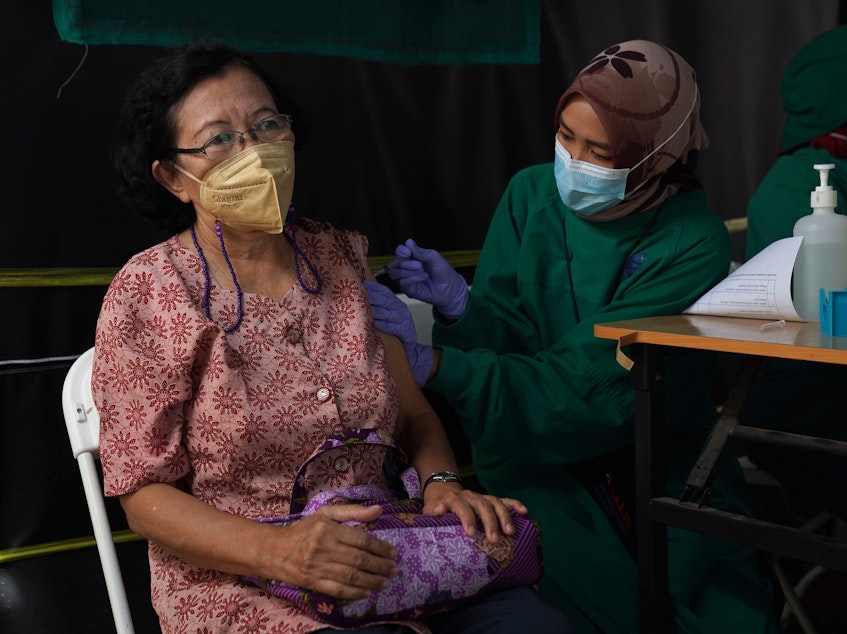Booster longevity: Data reveals how long a third shot protects

We've known for about a month now that a third shot of the vaccine is critical for protecting against infection with the omicron variant — and for keeping people out of the hospital.
Now researchers in the U.K. have the first estimates for how long a third shot of the Pfizer vaccine will last. And the findings are mixed.
Protection against infection is likely short-term, lasting less than six months, but protection against severe disease appears more robust, researchers with the U.K. Health Security Agency reported Friday.
Specifically, the researchers found that right after the third shot of the Pfizer vaccine, protection against a symptomatic infection is pretty good. Two weeks after the shot, the booster cuts the risk by about 70%.
But that protection falls quickly. By three months the booster only reduces the risk of a symptomatic infection by about 50%.
Sponsored
In a second analysis, the U.K. researchers estimate the protection will decline even further, dropping to about 40% about four months after the third shot.
"The vaccine's efficacy against infection relies on our level of antibodies because they are really our first line of defense against SARS-CoV-2," says immunologist Jennifer Gommerman at the University of Toronto.
With any vaccine, the level of antibodies rises quickly right after the shot and then diminishes again with time. "That is perfectly normal and expected," she says, "So in terms of protection against infection, we will see some protection early on with a booster, but that protection is going to wane.
"Keep in mind, too, that omicron is very different than the original version of SARS-CoV-2, which is what we've been immunized against," Gommerman adds. "And so our protection takes a bit of a hit in terms of how well those antibodies can recognize omicron."
On the other hand, she says, protection against severe disease doesn't depend so heavily on antibodies. The vaccine triggers other parts of the immune system that help keep an infection from getting out of control.
Sponsored
"So with declining antibody levels, you might be vulnerable to an infection but not necessarily vulnerable to disease – that's a different kettle of fish."
Indeed, the study from the U.K. found that the booster offers more robust protection against severe disease than against infection. Specifically, the researchers found that, after a third shot of Pfizer, protection against hospitalizations starts out above 95% (two weeks after the shot) and remains at around 80% even after four months.
By comparison, with only two shots of any vaccine, protection against severe disease declines to 40% after six months.
The researchers only have short-term data for the Moderna vaccine, but the results are likely to echo the Pfizer numbers given the similarities of these mRNA vaccines and their comparable behavior with the delta variant.
The findings from the study raise the question of what the future holds for these vaccines, says immunologist Deepta Bhattacharya at the University of Arizona.
Sponsored
"I don't think it's a sustainable strategy to ask people to get boosters of the same vaccine every two months or three months. People just aren't going to do it.," he says. "I myself felt awful after I got the second of the third shots."
Perhaps, instead, the goal may need to shift from stopping infections to making sure everyone is protected against severe disease over the long-term.
"Could we get to the point where public health officials recommend a shot once a year," Bhattacharya says. "I think that's fairly likely. Now, whether everyone will absolutely need that shot to prevent severe disease each year, that's a different question, and we'll have to wait for the data. I think it's possible that yearly shots won't be absolutely essential for everyone."
And he hopes that the periodic COVID surges will be a bit more predictable, as flu season is now, so that people can receive a booster right before an expected surge, gaining short-term protection against infection when it's needed most. [Copyright 2022 NPR]



